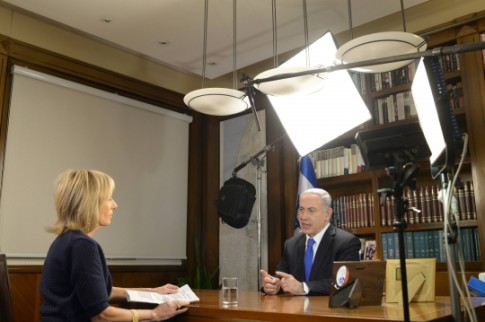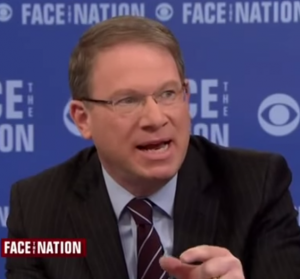– Iranians Are Much Talked About on Sunday Morning TV, But Never Heard From (The Intercept, April 11, 2015):
Sunday morning news television is where Washington sets its media agenda for the week and, more importantly, defines its narrow range of conventional, acceptable viewpoints. It’s where the Serious People go to spout their orthodoxies and, through the illusion of “tough questioning,” disseminate DC-approved bipartisan narratives. Other than the New York Times front page, Sunday morning TV was the favorite tool of choice for Bush officials and neocon media stars to propagandize the public about Iraq; Dick Cheney’s media aide, Catherine Martin, noted in a memo that the Tim Russert-hosted Meet the Press lets Cheney “control message,” and she testified at the Lewis Libby trial that, as a result, “I suggested we put the vice president on Meet the Press, which was a tactic we often used. It’s our best format.”
Over the last couple months, the Sunday morning TV shows — NBC’s Meet the Press, CBS’s Face The Nation, ABC’s This Week, Fox’s News Sunday, and CNN’s State of the Union — have focused on a deal with Iran as one of their principal topics. In doing so, they have repeatedly given a platform to fanatical anti-Iran voices, including Israeli officials such as Prime Minister Benjamin Netanyahu. They have sycophantically interviewed officials from the U.S.-supported, anti-Iranian Gulf tyrannies such as Saudi Arabia and Jordan; two weeks ago, Chuck Todd interviewed Saudi Ambassador to the U.S. Adel Al-Jubeir and didn’t utter a word about extreme Saudi repression, but actually did ask this “question”:
Are the foot rubs we Americans are giving to you to your liking, Mr. Saudi Ambassador, or do you feel that we must make them more vigorous? In the last three weeks alone, Meet the Press has interviewed the Israeli prime minister, the Saudi ambassador, and the Israeli ambassador to the U.S.
Meanwhile, their “expert media panels” almost always feature the most extremist “pro-Israel,” anti-Iran American pundits such as Jeffrey Goldberg, who played a leading role in spreading false claims about Iraq under the guise of “reporting” (and only became more beloved and credible in DC for it), was dubbed Netanyahu’s “faithful stenographer” by New York Times columnist Roger Cohen, and even joined the Israeli military in his young adulthood. In 2014, Face the Nationinterviewed Netanyahu five times and featured his “faithful stenographer,” Goldberg, three times; in 2015, the CBS show just last week interviewed Netanyahu and has already hosted Goldberg four times. ABC’s This Week with George Stephanopoulos actually features supreme neocon propagandist Bill Kristol as a regular “ABC News Contributor” and has also interviewed Netanyahu. And that’s to say nothing of the “hawkish,” AIPAC-loyal and/or evangelical members of the U.S. Congress who are fanatically devoted to Israel and appear literally almost every week on these programs.
But as these shows “cover” the Iran deal, one thing is glaringly missing: Iranian voices. There has not been a single Iranian official recently interviewed by any of these Sunday morning shows. When I raised this issue on Twitter a couple of weeks ago, a Meet the Press senior editor, Shawna Thomas, said the show had “put in a request” with Iran for an interview, while MSNBC’s Chris Hayes also suggested that it can be difficult to secure interviews with Iranian government officials.
That may be, but even if it is difficult to obtain interviews with Iranian government officials, it is extremely easy to interview Iranian experts, scholars, journalists and other authoritative voices from Tehran. Last week, Democracy Now’s Amy Goodman and Juan Gonzalez hosted a fascinating hour-long discussion about Iran with Seyed Hossein Mousavian, a former nuclear negotiator for Iran who was Iran’s ambassador to Germany from 1990 to 1997, and now teaches at Princeton. Just this week, CNN International’s Christiane Amanpour interviewed Tehran University Professor Sadegh Zibakalam about Tehran’s views and actions in the Iran deal. Beyond those in Iran, there are Iranian-American groups and Iranian-American experts who actually speak Farsi who don’t see the world the way Jeffrey Goldberg and Lindsey Graham do. Outside the Sunday shows, Iranian officials have been interviewed occasionally by U.S. media figures.
In sum, the only way to exclude Iranian voices is if you choose to exclude them. That’s exactly what Sunday morning television programs have done, and continue to do. And it matters a great deal for several reasons.
For one, excluding the Iranian viewpoint ensures that these shows spew propaganda to the American public. Iran is talked about, almost always in demonic terms, but is almost never heard from. That means that these shows, which endlessly boast of their own “objectivity,” are in fact far more akin to state media.
My Intercept colleague Jon Schwarz this week wrote an article detailing seven historically indisputable facts about what the U.S. has done to Iran — which cause some in that country to chant “Death to America” — and it went viral. Why? Because those facts, though quite well-established, are virtually never mentioned in U.S. media accounts that depict Iran as filled with irrational, primitive, inexplicable hatred for the U.S., designed to show how unstable and blindly hateful they are. That is propaganda by definition: amplifying one side’s views (the U.S. and Israeli governments’) while suppressing others’.
Then there’s the ease with which those who are rendered invisible are easily demonized. For decades, the key to depicting gay people as mentally ill predators was ensuring they were never heard from, forced to be mute in the closet; once they were out in the open and understood, that demonization became impossible.
This has also been the favored foreign policy dynamic in the U.S. for decades. When Americans are killed by a foreign Muslim, we are deluged with information about the American victims and their grieving families, while we hear almost nothing about the innocent victims killed by the U.S. or its allies — not even their names. This gross imbalance in coverage creates the illusion that Americans are innocent victims of terrorism but never its perpetrators. Identically, when American journalists are imprisoned by an adversary of the U.S. government, American journalists trumpet it endlessly, while foreign journalists imprisoned for years with no trial by the U.S. government are all but disappeared. Silencing The Other Side is a key U.S. media propaganda tactic.
There are all sorts of dubious claims presented about Iran, the U.S. and Israel that are treated as unchallenged truth in U.S. media discourse. The range of “debate” allowed by the U.S. media — is Obama’s deal with Iran a good idea or not? — all assumes those dubious claims about Iran to be true. But those claims are vehemently disputed in large parts of the world, certainly in Tehran. But Americans, especially the millions who get their news from Sunday morning television or from outlets whose agenda is shaped by those programs, literally have no idea about any of that, because the people who can best advocate those views — i.e. Iranians — are simply never heard from.
It’s remarkably telling that the only voices heard on Sunday morning TV shows are those who spout the U.S. government line about Iran, including officials from the repressive regimes most closely allied with the U.S. Obviously, one can find the arguments of Iranians unpersuasive or even harbor hostility to that nation’s government, but what possible justification is there for the leading Sunday morning news shows in the U.S. to simply suppress those views altogether?


